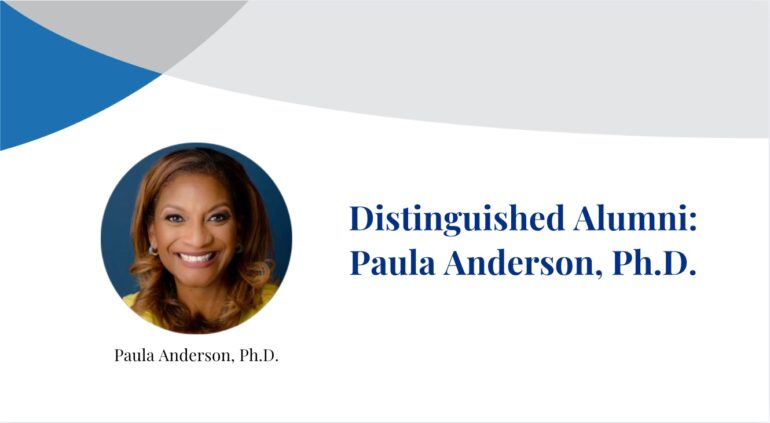Like many people from working-class backgrounds, Paula Anderson, Ph.D., saw college as her ticket to a better life. When she headed off to the University of Virginia, she was focused on building a career that would give her the stability and opportunities her family never had.
“My parents were immigrants from Jamaica, so I’m a first-generation American,” says Dr. Anderson, a licensed clinical professional counselor in the state of Maryland, a nationally certified counselor, and one of five honorees receiving The Chicago School’s 2024 Distinguished Alumni award. “I was born and raised in the Bronx, New York. I didn’t want to be low-income anymore, so I wanted to be a doctor or lawyer because I thought doctors and lawyers made a lot of money.”
When she realized that becoming a doctor involved dealing with blood and encountered many challenges in her attempts to go to law school, she decided to pursue psychology.
“I love analyzing human behavior,” Dr. Anderson says. “I took a psychology class and realized, ‘Wait a second. I really like this.’ I did well, so I stuck with it.”
Dr. Anderson subsequently went to graduate school at The George Washington University, where she got her master’s degree in community counseling. “Even though I studied psychology, I honestly had never thought about becoming a therapist because I thought at the time that therapists typically don’t make a high salary,” she says. “But I changed my mind. I thought, ‘If I don’t make a lot, that’s OK, because I really want to help people.’”
Dr. Anderson recognized that a counseling career could fill her cup even if it didn’t fill her coffers. “When I was younger, I loved talking to people and giving advice,” she says. “When I was searching for a career path, people kept telling me, ‘You’re a really good listener, and you’re good at helping people solve problems.’ With counseling, something just awoke inside me.”
After graduate school, Dr. Anderson became a counselor at a special education school in Washington, D.C., where she worked with children who had emotional and behavioral challenges.
“Many of them came from poor neighborhoods and disadvantaged backgrounds. The students I worked with have been through a good deal of trauma. As a result, they often struggled with managing their emotions,” Dr. Anderson says. “Many times, they lashed out by hitting others or fighting because they were dealing with so much pain inside, but I still loved them. They were my babies, and I just wanted so badly to help them.”
Working in special education schools was extremely rewarding but also extremely taxing. After eight years in special education, Dr. Anderson was burned out. She decided to open a new chapter: In 2007, she started her own business, PACE Consulting, which provides clinical behavioral health counseling to individuals, children, and families in College Park, Maryland, as well as organizational consulting to schools, universities, corporations, nonprofits, and government agencies.
While the clinical side of her business was born from her career in schools, the consulting side—it includes organizational consulting services in workplace wellness; stress management; organizational culture; leadership and team development; and diversity, equity, and inclusion (DEI)—was buoyed by her decision to continue her education at The Chicago School, where she earned her Ph.D. in Business Psychology in 2021.
“Getting my Ph.D. in Business Psychology helped me add a whole new line of business to my company,” says Dr. Anderson, who now has a staff of nearly 30 people.
Although it’s not the medical or legal career she once coveted, being a counselor and an entrepreneur has unlocked a different, more meaningful kind of wealth.
“I’m having more impact than I ever thought I could have,” Dr. Anderson says. “People have told me that without our services, a child would have hurt themself, or a parent would have hurt a child, or an employee might not have shown up for a job they needed to provide for their family. We’re providing services that literally save lives.”

